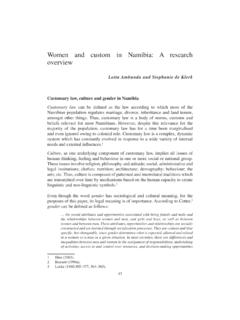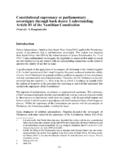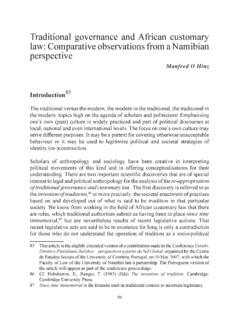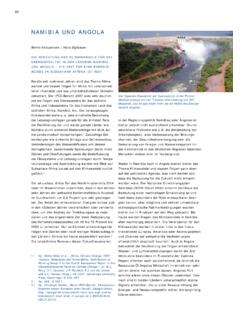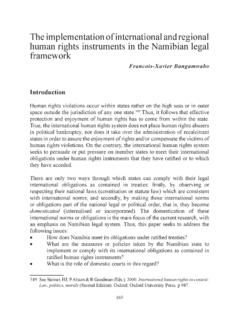Transcription of Felicity !Owoses-/Goagoses
1 177 Custody and guardianship of childrenFelicity ! owoses -/GoagosesIntroductionPursuant to its powers under Article 441 of the Namibian Constitution, Parliament2 enacted the Children s Status The Act has made immense changes in the status of children born outside marriage (also referred to as illegitimate children). The status of children born inside marriage (also referred to as legitimate children) is uncontroversial. For the purpose of this paper, use of the terms legitimate and illegitimate are avoided in favour of the phrases children born inside marriage and children born outside marriage, aim of this paper is to revisit the status of children born inside or outside marriage. Furthermore, it addresses custody and guardianship of such children. Moreover, it explains the status of the said categories of children before the enactment of the Children s Status Act, upon its enactment, and the implications of these changes for the said children and other persons to whom the Act Children s Status ActThe enactment of this law is a result of the discriminatory practices imposed by common law and statutory law between children born inside or outside marriage in matters relating to custody, guardianship and The short title of the Act reinforces the reasons underlying the enactment of the Act, as follows: 1 Article 44 provides as follows: The legislative power of namibia shall be vested in the National Assembly with the power to pass laws with the assent of the President as provided in this Constitution subject, where applicable, to the powers and functions of the National Council as set out in this Article 146(1)(a) provides as follows.
2 Parliament shall mean the National Assembly and, once the first National Council has been elected, shall mean the National Assembly acting, when so required by this Constitution, subject to the review of the National No. 6 of 2006; hereinafter referred to as the Act or the Children s Status Act, depending on context. The Act came into operation on 3 November 2008 in terms of Government Notice No. 266 of 3 November Heathcote AJ delivered the judgement in Frans v Paschke & Others, 2007 (2) NR 520 (HC), para. 19, declaring the common law rule barring children born outside of marriage from inheriting intestate from their fathers s rights in NamibiaTo provide for children born outside marriage to be treated equally regardless of whether they are born inside marriage or outside marriage; to provide for matters relating to custody, access , guardianship and inheritance in relation to children born outside marriage; to provide for matters which are in the best interest of all children; and to provide for matters connected addition, the Act aims to remedy the situation explained above.
3 Accordingly its objectives are to promote and protect the best interests of the child and to ensure that no child suffers any discrimination or disadvantage because of the marital status of his or her parents and this Act must be interpreted in a manner consistent with these Children s Status Act contains certain important definitions, which are as follows:6 child means a person who is under the legal age of majority; marriage means a marriage in terms of any law of namibia and includes a marriage recognised as such in terms of any tradition, custom or religion of namibia and any marriage in terms of the law of any country, other than namibia , which marriage is recognised as a marriage by the laws of namibia ; parent means a woman or a man in respect of whom parentage has been acknowledged or otherwise established; sole custody means the exercise of the rights, duties and powers of custody by one person, to the exclusion of all other persons; and sole guardianship means the exercise of the rights, duties and powers of guardianship by one person, to the exclusion of all other reference to age of majority in the definition of a child is a reference to the Age of Majority Act,7 which fixes the age of majority at 21 The definitions are important for understanding to whom the Act applies the rights and responsibilities of the persons to whom the Act applies, and the legal consequences that attach to the said rights and responsibilities.
4 What is parental authority?The common law9 concept of parental authority10 (also referred to as parental 5 Section Section No. 57 of Section Section 1(1) of the Administration of Justice Proclamation No. 21 of 1919 made the Roman Dutch law, as it existed and was applied in the Cape of Good Hope as at 1 January 1920 and after that date, the Common Law of the Protectorate (South West Africa). Article 66 of the Namibian Constitution recognises common law as part of Namibian law. See also R v Goseb, 1956 (2) SA 696 See Spiro (1985:84), who explains that some writers refer to parental authority as distinct from parental power, but that the terms are synonymous in his and guardianship of childrenpower)11 refers to the complex of rights, powers, duties and responsibilities vested in or imposed upon the parent, by virtue of their parenthood, in respect of their minor child and his or her property. For the purpose of this paper the term parental authority is common law concept of parental authority has two components, namely custody, and Heerden states that custody is that portion of parental authority which pertains to the personal day-to-day life of the Custody is also seen as the control and supervision of the daily life and person of the The common law concept of custody includes the following duties:15 The duty to provide the child with accommodation, food, clothing and medical care The duty to maintain and support the child The duty to educate and train the child, and The duty to care for the child s physical and emotional is used in two senses: one broad, the other narrow.
5 In its broad sense, guardianship is equated with parental authority and includes custody. It is seen as the lawful authority which one person has over the person and/or property of another who suffers from the incapacity to manage his or her own affairs and/or person, in the interest of the In its narrow sense, guardianship refers, firstly, to the control and administration of the child s estate, and secondly, to the capacity to assist and represent the child in legal proceedings or in performance of juristic In this latter sense, guardianship is seen as relating exclusively to the guardianship of minors. In this context, the term natural guardian is used as a synonym for parental Both Van Heerden19 and Sch fer20 agree that the latter narrow definition is the more common and sensible approach when it comes to the guardianship of Children s Status Act does not define the terms custody and guardianship; hence, these terms retain their common law meanings as explained above.
6 Unlike namibia , South Africa has codified and amended the common law concept of parental authority 11 Van Heerden (1999:313). In Chief Family Advocate & Another v G, 2003 2 SA 599 W 601 para. I, the courts seem to use the term parental responsibility as being synonymous with parental authority and parental Van Heerden (1999:313).13 (ibid.).14 Sch fer (2007:38).15 (ibid.). 16 Van Heerden (1999:313).17 Sch fer (2007:38).18 Van Heerden (1999:313).19 (ibid.).20 Sch fer (2007:38).180 Children s rights in Namibiaand replaced it with parental rights and responsibilities ,21 while the term custody has been replaced with care 22, and the term access with contact .23 The concepts of sole custody and sole guardianshipSch fer states that a distinction is made in South African law between (single) custody and sole custody, and (single) guardianship and sole These distinctions have an impact on the rights and duties of the parents in each case.
7 Sch fer further states that a parent with sole custody is subject to all the duties imposed by common law in relation to custody, with the additional power of appointing, by testamentary disposition, any person to be vested with sole custody of the With respect to sole guardianship, Sch fer states that a sole guardian has all the powers, and is subject to all duties imposed by common law, with the additional power of appointing a testamentary guardian. 26 namibia seems to have followed the South African law as to the meaning of the concepts sole custody and sole The Children s Status Act defines these terms as the exercise of the rights, duties and powers of custody or guardianship by one person, to the exclusion of all other 13(3) of the Act provides that any of the following persons may seek an order for sole guardianship: 21 Section 18, Children s Act, 2005 (No. 38 of 2005).22 (ibid.:section1(2)).
8 23 (ibid.). 24 Sch fer (2007:41).25 (ibid.).26 (ibid.:35).27 In respect of sole custody, section 20(2) and (3) provides as follows:(2) A parent with sole custody of a child may, by will or other testamentary disposition, appoint any other person as a custodian of the child, and where a will or other testamentary disposition appoints a guardian without naming a custodian, that guardian is the custodian of the child unless a competent court, on application made to it, directs otherwise.(3) Where a parent shares joint custody with another parent because the parents are or were married, or in terms of any law or agreement, the surviving parent acquires sole custody upon the death of the other parent, unless a competent court, on application made to it, directs otherwise. In respect of sole guardianship, section 21(2) (4) provides as follows:(2) On the death of one of two equal guardians, the surviving guardian does, unless a competent court directs otherwise, acquire sole guardianship over a child.
9 (3) A person with sole guardianship of a child may, by testamentary disposition, appoint another person as the sole guardian of that child.(4) Where there is no provision in a will or other testamentary disposition naming a guardian for a child, or where there is for any other reason no competent guardian for a child, a guardian can be registered for the child by means of the procedure contained in this Section and guardianship of childrenThe following persons may seek a court order granting sole guardianship to one parent, or to some other person:(a) either parent;(b) the child;(c) someone, other than the mother or father of the child, who is acting as the primary caretaker of the child; or(d) a person authorised in writing by the Minister to act on behalf of the 13(7) of the Act provides as follows, however: Unless the children s court orders otherwise, the written consent of both parents is required for (a) the adoption of the child, subject to the provisions for dispensing with any required consent, contained in the law on adoption.
10 Or(b) the removal of a child from namibia for a period longer than one provisions of section 13(3) and 13(7) seem to apply to both children born inside marriage and those born outside A reading of section 13(7) suggests that an order of sole guardianship does not divest the person who does not have guardianship from parental authority in total, and that such person retains the right of consent as provided in that authority and the Namibian lawThe common law concept of parental authority is treated as being outmoded and unsatisfactory as it treats parental authority from a parent s point of namibia has made commitments both domestically31 and internationally32 to observe, protect and uphold children s rights. For example, Article 15(1) of the Namibian Constitution provides as follows:Children shall have the right from birth to a name, the right to acquire a nationality and, subject to legislation enacted in the best interest of children, as far as possible the right to know and be cared for by their parents.
